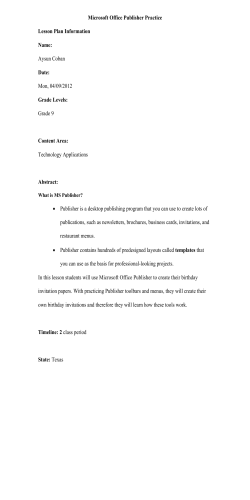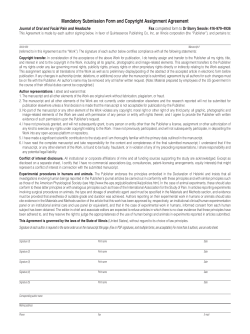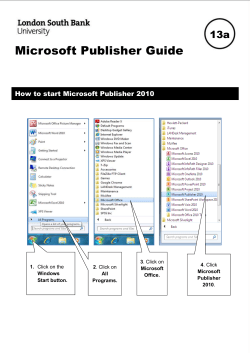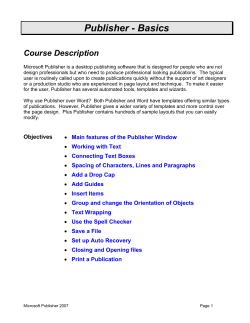
Publishing - FAct sheet For writers The role of a publisher:
Publishing - FAct Sheet For writers The role of a publisher: The purpose of entering into a publishing agreement is for you, the writer, to have your compositions or songs exploited for maximum income, without having to do this all yourself. You assign the copyright in your musical works to a publisher so they can try to generate as much licensing income for the works as possible, through use in television programmes or advertisements, having other artists record and perform the works, getting them onto compilation CD/DVDs, and so forth. A publisher can also help you get a record or management deal, help fund your demos, and give you an advance on your royalties in order to support you while you write your music. They do this for you in exchange for a percentage of the royalties they receive on your behalf. As a published writer, you may be expected to deliver a number of works during the term of your agreement; the number would be determined in your contract e.g. three albums worth. It is then up to your publisher, with your help, to get as much exposure for the music as possible while also protecting you and your works from any unauthorised or undesired usage. The publisher must actively work to exploit your catalogue and many contracts have clauses to ensure this happens. The different right types As a copyright owner, you control the following rights relating to different kinds of exploitation of your works, and your agreement will usually require the publisher to pay you a percentage of the royalties (licensing fees) they receive on your behalf for each of these rights; • Performance and Communication to the public: This refers to the public performance or communication of your music e.g. on radio, television, in pubs and clubs or live in concert. APRA is responsible for licensing of the rights of performance and communication to the public in Australia and New Zealand, so publishing contracts signed by APRA member writers should state that the writer’s assignment of rights to the publisher is subject to their assignment to APRA. • Mechanical (or Reproduction): Any time your work is reproduced for sale, e.g. on CD, DVD, Digital Downloads or ringtones, a mechanical licence fee must be paid. AMCOS is responsible for licensing of certain types of reproduction (as selected by its members) in Australia and New Zealand. • Print: This refers to sales of sheet music of your works. • Synchronisation: To reproduce your music in a film or television show (i.e. synchronise your music with a visual image), the film/TV production company needs to obtain a synchronisation licence. One of the main reasons a writer assigns their works to a music publisher is so the publisher can promote their music to film/TV production companies in order to generate “synch” royalties. • Covers: This refers to when an artist, other than yourself, records and releases one of your works. • Sundry: This refers to the all other ‘miscellaneous’ uses of your work that do not fall into any of the major categories. For example, this can include the printing of your lyrics on a t-shirt. The different types of publishing agreements General Works: This is the most common type of agreement and refers to the writer’s entire catalogue, excluding any works that are already subject to any other specific agreements. Specific works: As the name suggests, this agreement is more specific in terms of the works that are assigned to the publisher. Depending on what is agreed to in your contract, this could be anything from a one song (single song assignment) or a one album agreement. If you are in multiple bands, you may also only get a specific agreement for your songs written for one band, but all of your other songs will remain unpublished. These agreements can be tailored to any arrangements that you and your publisher agree on. Works for hire: This is a type of specific works agreement and is mainly for TV/film and jingle writers. Long ago publishers or production houses would keep a song writer on staff to write works for any future productions. As that is no longer the norm, a “works for hire” agreement is now made. In this agreement the writer is signed to a deal for a certain term, e.g. five years and will be paid periodic advances throughout the term, and in return the writer will deliver a minimum number of works. Definitions Term of agreement - this refers to length or duration of the agreement and how long your publisher has control of your works. Whether it is for “Life of Copyright”, or a number of years, the agreement should have the term listed. Many agreements state that the term is for an initial duration, but automatically extends from year to year until terminated in writing by either party (subject to recoupment of advances). Retentions - Once an agreement has been ‘terminated’, the publisher may still retain copyright in the works for a certain period. This is usually when advances have not yet been recouped, or the contract states the publisher retains the works for a set period after the termination, or it was in the original contract that the works delivered during the term were to be retained for the life of copyright but the publisher no longer acquires any new works by the writer following termination. Advance - A publisher will usually pay a sum of money to a writer when they are first signed. This is to help with expenses while the writer is composing works. The advance is viewed as a type of loan, and is expected to be recouped by the publisher. It is a pre-payment of your royalties. Recoupment - the ‘advance’ is expected to be paid back through recoupment of the royalties earned by the published works. However, other expenditure on the writer may also be viewed as recoupable, and this should be agreed to by both parties and not just added to your royalty account without your knowledge. As works earn royalties, the publisher will keep all royalties they receive, or a percentage of these, until the sum of the advance/agreed expenditure has been paid back. Once the publisher has recouped advances paid to the writer, they will then pay the writer the shares of royalties originally agreed to in the contract. If the songs do not generate any money, the advance and expenditure is never recouped. Schedule - This is a list of works that are subject to the publishing agreement, usually at the back of the contract. For general works agreements, it is understood that the schedule only lists those works assigned at the commencement of the agreement, and it is the writer’s responsibility to advise the publisher of additional works they write during the term of the agreement so that the publisher can register these works with APRA|AMCOS and begin to promote and license them. Territory - This refers to the regions of the world in which the publisher acquires the copyright in your works. Most publishers will try to sign a writer to an agreement for the World/Universe, but others may only sign a writer for individual countries or territories. How publishing is administered by APRA|AMCOS Agreements with publisher members of APRA: If you sign a publishing agreement with an APRA member, for example Green Boots Music Australia, then Green Boots Music Australia would register their agreement with APRA|AMCOS, and we would credit them as publisher on our ownership records for the appropriate works, so they receive a share of the works’ royalties (usually 50% of performing right royalties and 100% of mechanical right royalties). The percentages that the publisher collects from APRA and AMCOS are not to be confused with the percentages for each right type that the agreement requires the publisher to onpay to the writer out of royalties they receive. If you sign a general works agreement with an APRA publisher, you need to notify them of any new works you write during the term of your agreement, so the publisher can register them with APRA. Agreements signed with foreign publishers: If you sign an agreement with a foreign publisher, you need to send APRA a copy of the contract so we can update our records accordingly. If the publishing agreement includes the territories of Australia and New Zealand, you need to make sure your internet registrations for the relevant works include your publisher and allocate the appropriate collection percentage to that publisher. Note: In music business terminology, your works are only “published” if you have assigned them to a music publisher in a publishing agreement/contract. Releasing your songs on CD or DVD does not mean that they are “published”. membership enquires Phone 1800 642 634 [email protected] www.apra-amcos.com.au NSW Head office 16 Mountain St Ultimo NSW 2007 P: 61 2 9935 7900 VIC/TAS 3 & 5 Sanders Pl Richmond VIC 3121 P: 61 3 9426 5200 QLD 3 Winn St Fortitude Valley QLD 4006 P: 61 7 3257 1007 SA Suite 29/8-20 O’Connell St North Adelaide SA 5006 P: 61 8 8239 2222 NT GPO Box 4519 Darwin NT 0801 P: 0447 447 646 WA Suite 1/12-20 Railway Rd Subiaco WA 6008 P: 61 8 9382 8299
© Copyright 2026











